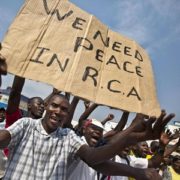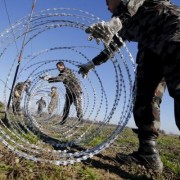Il sit-in all’aeroporto di Hong Kong e gli scontri sempre più violenti per le strade della città mettono in luce un confronto diretto tra due strategie, dei radicali e delle autorità, con ricadute pesanti in ogni caso su Pechino.
All’apparenza, la strategia delle autorità del territorio, sostenute da Pechino, era quella dell’usura del movimento. Ritirarsi tatticamente sul punto più spinoso, sospendere sine die il controverso decreto che autorizzava l’estradizione verso la Cina.
Quindi l’idea era contenere le proteste e tirarle alla lunga fin quando le scuole sarebbero state riaperte, a settembre, e la gente normale che va a lavorare o ha il negozio, sente nelle proprie tasche il peso del caos. Tale strategia aveva avuto successo contro il movimento degli ombrelli del 2014. Allora i giovani chiedevano il suffragio universale.
Allora, del resto come nel 1989, non c’era interesse a isolare la Cina in ambito internazionale e la cautela e forza di Pechino, il misto di minacce e offerte, erano piaciute anche al mondo.
Questa volta forse però è diverso, perché gli Usa hanno una dura controversia internazionale con la Cina e Hong Kong può essere una miccia per esasperare una tensione più generale.
In effetti, al di là di accuse facili, a Pechino sembrano sapere che il governo USA non ha messo mano a Hong Kong, e che gli stranieri che si schierano in sostegno della protesta lo fanno in modo individuale.
Quindi alcuni radicali di Hong Kong possono volere contrastare la strategia del logoramento alzando la posta in gioco e cercando di provocare Pechino per un intervento sanguinoso che faccia esplodere le tensioni. Il sit-in con il blocco dell’aeroporto di Hong Kong va in questa direzione.
Difficile che la terza borsa più importante del mondo possa tollerare a lungo di funzionare senza un aeroporto. In queste condizioni poi, Hong Kong potrebbe crollare con conseguenze inimmaginabili per la Cina e la finanza globale.
Si vede qui al lavoro la vecchia teoria rivoluzionaria leninista: il peggio è meglio, perché apre alla rivoluzione. Che poi la rivoluzione spalanchi le porte alla dittatura dei generali o dei neo bolscevichi non importa.
Per questo Pechino, Washington e paesi della regione potrebbero volere un accomodamento, e i radicali invece possono spingere per una resa dei conti presto.
In ciò poi c’è anche la partita di Pechino. Il presidente Xi Jinping è circondato da nemici pronti a dichiarare che egli sta sbagliando comunque: sbaglia se cede alle richieste dei dimostranti, sbaglia se reprime con la forza.
Diversamente da Deng nel 1989, ai tempi di Tiananmen, Xi non ha il sostegno di una vecchia guardia con le mani in pasta nei gangli del partito, né ha la sponda americana, che allora voleva tenere la Cina ancora allineata a sé in funzione antisovietica, visto che l’URSS non era ancora crollata. Inoltre da circa un ventennio Pechino ha perso il senso di quello che davvero sta succedendo nel mondo ed è molto disorientata. In tali condizioni Xi è molto isolato ed è facile che commetta errori. In questo sperano i suoi nemici, che forse tramano per liberarsene.
I giovani radicali di Hong Kong forse non capiscono questi giochi, forse non se ne curano, forse pensano di dominarli e forse ne sono dominati.
Occorrerebbe che tutti facessero un passo indietro, che si aprissero nuovi canali internazionali di dialogo franco per togliere l’iniziativa dalle mani dei dimostranti forse troppo ingenui o troppo cinici. Ma questo è nel mondo della ragione. L’evoluzione della politica reale invece spesso sfugge alla ragione e precipita nel caos.
I prossimi giorni saranno cruciali per vedere se almeno si riesce a fare un passo indietro e guadagnare qualche settimana di respiro per non precipitare nell’abisso.
The sit-in at Hong Kong airport and the increasingly violent riots on the streets of the city highlight a direct confrontation between two strategies, the radicals and the authorities, with heavy repercussions in any case on Beijing.
Apparently, the strategy of the Territorial Authorities, supported by Beijing, was to wear out the movement. Withdraw tactically on the thorniest point, suspending sine die the controversial decree authorizing extradition to China.
So the idea was to contain the protests and take them in the long run until the schools will reopen in September, and the normal people who go to work or have the shop, feel in their pockets the weight of chaos. This strategy had been successful against the Umbrella Movement of 2014. Then the young people were asking for universal suffrage.
At that time, after all, as in 1989, there was no interest in isolating China in the international field and the world liked the caution and strength of Beijing, the mix of threats and offers.
This time, however, it is perhaps different, because the US has a hard international dispute with China and Hong Kong can be a fuse to exacerbate a wider tension.
In fact, beyond easy accusations, in Beijing they seem to know that the US government has not dealt with Hong Kong, and those foreigners who stand in support of the protest are doing so individually.
Therefore, some radicals from Hong Kong may want to counteract the strategy of wearing out by raising the stakes and trying to provoke Beijing for a bloody intervention that makes tensions explode. The sit-in with the Hong Kong airport block goes in this direction.
It is difficult for the third most important stock exchange in the world to tolerate long operation without an airport. In these conditions then, Hong Kong could collapse with unimaginable consequences for China and global finance.
We can see here the old Leninist revolutionary theory at work: the worst, the better, because it opens up to revolution. What then does the revolution open the doors to the dictatorship of the generals or the neo-Bolsheviks does not matter.
This is why Beijing, Washington, and Countries in the region might want a settlement, and radicals, on the other hand, can push for a showdown soon.
Moreover there is the Beijing game. President Xi Jinping is surrounded by enemies ready to declare that he is wrong anyway: he is wrong if he yields to the demands of the protesters, he is wrong if he represses by force.
Unlike Deng in 1989, at the time of Tiananmen, Xi does not have the support of an old guard with his hands in the party ganglions, nor does he have the American side, which then wanted to keep China still aligned to itself in an anti-Soviet function, since the USSR had not yet collapsed. Moreover, since about twenty years, Beijing has lost the sense of what is really happening in the world and is very disoriented. In these conditions, Xi is very isolated and it is easy for him to make mistakes. In this are hoping his enemies, who perhaps plot to get rid of them.
The young radicals of Hong Kong may not understand these games, perhaps they don’t care; maybe they think they dominate them and maybe they are dominated by them.
It would be necessary for everyone to take a step backwards, to open up new international channels of frank dialogue in order to remove the initiative from the hands of demonstrators, perhaps too naive or too cynical. But this is in the world of reason. The evolution of real politics instead often escapes reason and falls into chaos.
The next few days will be crucial to see if at least it is possible to take a step back and gain a few weeks of respite to avoid falling into the abyss.






No nice perspective.
The way the UK Brexit has been perceived by Continental Europe (and Ireland) is probably the same way people in Mainland China see Hong Kong demonstrations/riots – a meltdown. With no one taking care of UK and no one taking care of Hong Kong.
Carsten Boyer Thøgersen
Copenhagen
Former Consul-General in Shanghai and Guangzhou
https://www.scmp.com/comment/opinion/article/3022458/hong-kong-fast-forward-2047
Hong Kong, fast forward to 2047
The city need not fear a People’s Liberation Army bloodbath, but the likely scenario when ‘one country, two systems’ expires will be equally terrifying
Alex Lo
Published: 9:00pm, 12 Aug, 2019
Hong Kong will not suffer a People’s Liberation Army bloodbath. Most likely, it will bleed out. Let’s consider this likely, though terrible, scenario.
As the promise of 50 years of no change under “one country, two systems” expires in 2047, Hong Kong will cease to be a special administrative region, and become no more than an appendage of Greater Shenzhen.
By that time, the Greater Bay Area will have become fully integrated as a mega metropolis, one of the largest and most productive in the world. Shenzhen will not only be the nation’s pre-eminent hi-tech hub, but also that of the Asia-Pacific region.
Before that, Hong Kong, having failed to diversify its economy due to poor governance and obstructionism from the opposition, suffers negative growth compounded over the next quarter of a century. No political reform succeeds despite repeated talks about reactivating the process as neither the central government nor the opposition will give way.
The Hong Kong government is paralysed. No long or medium-term policy can be formulated or win approval from the opposition. Only the most urgent livelihood budgets can be made to keep people from utter poverty. Government revenue plunges and officials have to, first, dip into fiscal reserves, and then the Exchange Fund, used to defend the US dollar peg. By 2047, there will be no reserves left. The yuan is widely used in the city and many shops refuse to accept Hong Kong dollars.
Mass unrest led by secessionist radicals breaks out periodically. Tourism as an industry is a shadow of its former glory as neither mainlanders nor foreigners are interested in visiting.
Unemployment hits a record. The post of chief executive is abolished as Hong Kong is reduced to a municipal entity. Hong Kong officials beg the central government for economic favours such as those given in the early decades of one country, two systems and to allow northward migration to ease pressure on local entitlement spending, a source of recurrent government deficits.
But Beijing has grown tired of the city’s defiance and ingratitude, and has not been in a forgiving mood in years. Many young Hong Kong people try illegally to sneak through the border to find work in Shenzhen and the Greater Bay Area. Those who migrate north legally face discrimination, as they are accused of exploiting local services, from schooling to medical care.
Periodically, Shenzhen hooligans organise anti-Hong Kong rallies shouting, “Send back those Hongkie pigs!”